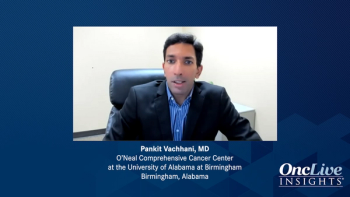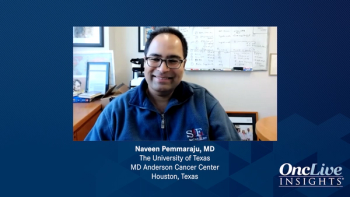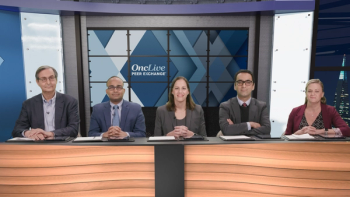
Scott Kopetz, MD, PhD, FACP, discusses the rationale for launching the phase 3 BREAKWATER trial in BRAF V600E–mutant metastatic colorectal cancer.

Your AI-Trained Oncology Knowledge Connection!


Scott Kopetz, MD, PhD, FACP, discusses the rationale for launching the phase 3 BREAKWATER trial in BRAF V600E–mutant metastatic colorectal cancer.

Ferdinandos Skoulidis, MD, PhD, MRCP, discusses molecular determinants of KRAS G12C inhibitor efficacy in advanced non–small cell lung cancer.

Elshad Hasanov, MD, PhD, discusses actionable immune-resistance targets in patients with renal cell carcinoma with brain metastases.

Michael Andreeff, MD, PhD, discusses the potential benefits of E-selectin inhibition in the AML tumor microenvironment, data that have contributed to the further development of uproleselan in this population, and additional AML targets under investigation that may broaden the treatment landscape.

VT3989, a first-in-class YAP/TEAD inhibitor, showcased durable antitumor activity and tolerability in patients with malignant mesothelioma and other solid tumors harboring NF2 mutations, according to data from a phase 1 trial presented at the 2023 AACR Annual Meeting.

Shared closing thoughts on the future treatment landscape for myeloproliferative neoplasms, including future and emerging areas of research and remaining areas of unmet need.

A review of recent trial data evaluating combination therapy approaches with ruxolitinib in myelofibrosis, including the rationale and potential clinical benefits associated with the use of these emerging strategies.

Samer A. Srour, MB ChB, MS, explains the unique construction of ALLO-316, the potential for ALLO-316 to address an unmet need in patients with clear cell renal cell carcinoma, and how early data from the TRAVERSE study support the continued investigation of ALLO-316 in patients with CD70-expressing tumors.

Ahmed O. Kaseb, MD, discusses the significance of results from the phase 3 IMbrave050 trial of adjuvant atezolizumab and bevacizumab for patients with early-stage hepatocellular carcinoma.

Michael Andreeff, MD, PhD, discusses the rationale for investigating uproleselan plus venetoclax and azacitidine in patients with acute myeloid leukemia.

Focused discussion on emerging trial data surrounding novel, investigational therapies for myelofibrosis.

Expert perspectives on treatment sequencing strategies with JAK inhibitors for myelofibrosis.

The combination of PARP and ATR inhibition with olaparib and ceralasertib was tolerable but showed limited efficacy in pediatric patients with advanced malignancies harboring DNA replication stress and DNA repair deficiencies, according to findings from arm N of the phase 1/2 AcSé-ESMART trial.

Pemigatinib generated efficacy and tolerability in previously treated patients with advanced/metastatic or unresectable solid tumors harboring activating FGFR mutations or fusions/rearrangements, including cholangiocarcinoma, central nervous system tumors, gynecologic tumors, and pancreatic cancer.

The allogeneic anti-CD70 CAR T-cell therapy ALLO-316 elicited signals of antitumor activity and showed a tolerable safety profile in patients with advanced or metastatic clear cell renal cell carcinoma.

Samer A. Srour, MB, ChB, MS, discusses the study design of the phase 1 TRAVERSE study, and key data on the use of ALLO-316 in patients with advanced or metastatic clear cell renal cell carcinoma.

Perioperative durvalumab plus neoadjuvant platinum-based chemotherapy demonstrated a statistically significant improvement in pathologic complete response and event-free survival vs placebo plus chemotherapy in patients with resectable non–small cell lung cancer.

Shannon N. Westin, MD, MPH, FACOG, shares preclinical data that provided the impetus for the SOLAR trial of olaparib and selumetinib in patients with RAS-mutated gynecologic cancers, key findings from the dose-escalation and -expansion portions of the research, and next steps with the combination.

Han T. Cun, MD, MS, discusses the findings from a retrospective comprehensive molecular classification of patients with grade 3 endometrioid endometrial adenocarcinoma.

Despite a high-profile clinical disappointment, the TIGIT immune checkpoint remains an important target for anticancer therapy, with research programs testing novel agents moving forward in non–small cell lung cancer and a range of other tumor types.

Shared insights on monitoring strategies for myelofibrosis, including important considerations for patients receiving treatment with JAK inhibitors.

Panel experts briefly review supporting data for the use of JAK inhibitors in myelofibrosis and discuss the impact of emerging data on the current treatment landscape.

Elias Jabbour, MD; Harry Paul Erba, MD, PhD; Anjali Advani, MD; and Sameem Abedin, MD, discuss key updates pertaining to the leukemia treatment landscape that were presented at the 64th American Society of Hematology (ASH) Annual Meeting and Exposition.

Expert perspectives on how to identify and assess patients with myelofibrosis for transplant therapy.

Comprehensive discussion highlighting diagnostic and molecular testing involved in the diagnosis of myelofibrosis, challenges related to early diagnosis, and consideration factors for assessing prognostic risk.

Expert panelists identify key takeaways and share their excitement for future directions in the management of metastatic colorectal cancer.

Shared insight on classification, risk factors, and important biomarkers and pathways in myelofibrosis.

Panel experts share insight regarding prognosis for patients with polycythemia vera and the associated risk for progression to myelofibrosis.

Shannon N. Westin, MD, MPH, FACOG, discusses the outcomes of the phase 1b SOLAR trial, which examined olaparib with selumetinib in patients with RAS-mutant gynecologic malignancies and other solid tumors.

The combination of durvalumab, tremelimumab, and hypofractionated radiotherapy demonstrated early tolerability in patients with gynecologic malignancies and elicited objective responses in those with PD-L1–high tumors.